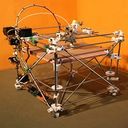25C3 - 1.4.2.3
25th Chaos Communication Congress
Nothing to hide
| Referenten | |
|---|---|
|
|
Zach Hoeken |
| Programm | |
|---|---|
| Tag | Day 3 (2008-12-29) |
| Raum | Saal 2 |
| Beginn | 21:45 |
| Dauer | 01:00 |
| Info | |
| ID | 2781 |
| Veranstaltungstyp | lecture |
| Track | Making |
| Sprache der Veranstaltung | en |
| Feedback | |
|---|---|
|
Haben Sie diese Veranstaltung besucht? Feedback abgeben |
Objects as Software: The Coming Revolution
How RepRap and physical compilers will change the world as we know it (and already have)

How physical compilers (CNC machines, laser cutters, 3D printers, etc) are changing the way we make things, how we think about the nature of objects. This talk will focus on the future of digital manufacturing, and how self-replicating machines will make this technology accessible to everyone: ushering in a new era of technological advance.
Open source software is essentially based on sharing instructions. These coded instructions deal with very tedious things no human would ever want to attempt manually. Luckily, we have computers that understand these instructions and gleefully execute them much faster than any human possibly could. Because of that, we have packets flying across the internet, multi-million pixel displays, and many other amazing technologies. This is all due to computers reliably executing our instructions perfectly and quickly. We know that if we write code on computer A, then it will function exactly the same on computer B (at least in theory ;)
Open source hardware is following a similar route: designs and instructions to create real, physical objects are freely shared. Currently it is fairly difficult to take a design for an object and automatically execute that design as a real object. Due to many exciting developments in the world of open source hardware, this is slowly changing. Things like CNC machines, laser cutters, and 3D printers are becoming more prevalent. These machines will become the physical computers of the coming revolution. As there machines become more and more prevalent, they will also likely increase in quality as well as decrease in cost, allowing people across the globe to digitally share designs which can be created and used locally, without requiring a large skill set to create them. Just as the computer revolution has allowed non-programmers to access the internet and do amazing things with their computers, the physical compiler revolution will allow non-engineers to download and 'print' objects such as robots, appliances, shoes, electronics, and more.
This revolution will transform physical objects into software that be sent around the world in an instant.
